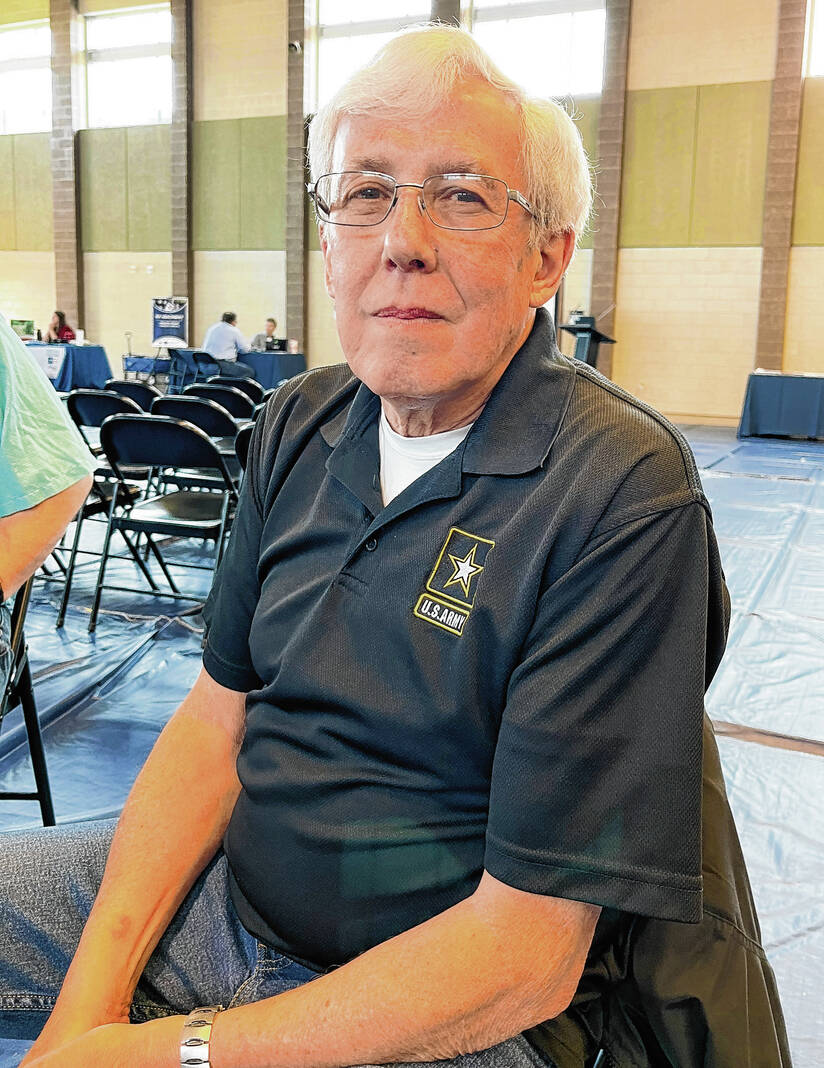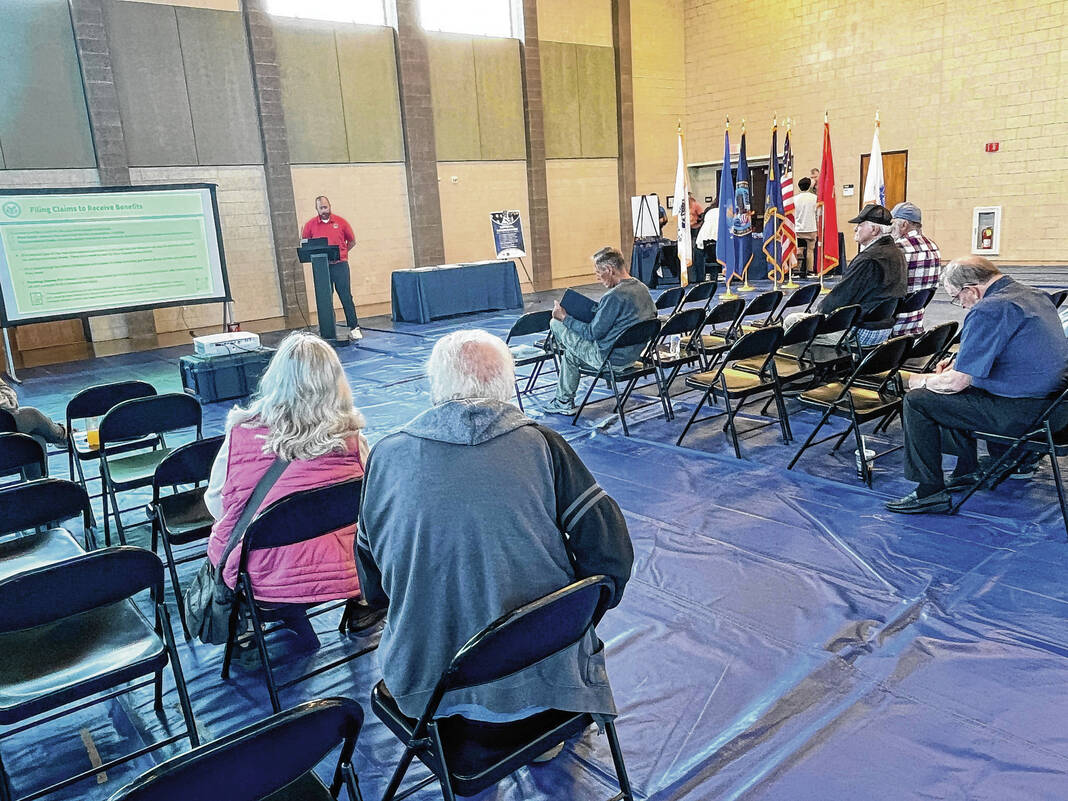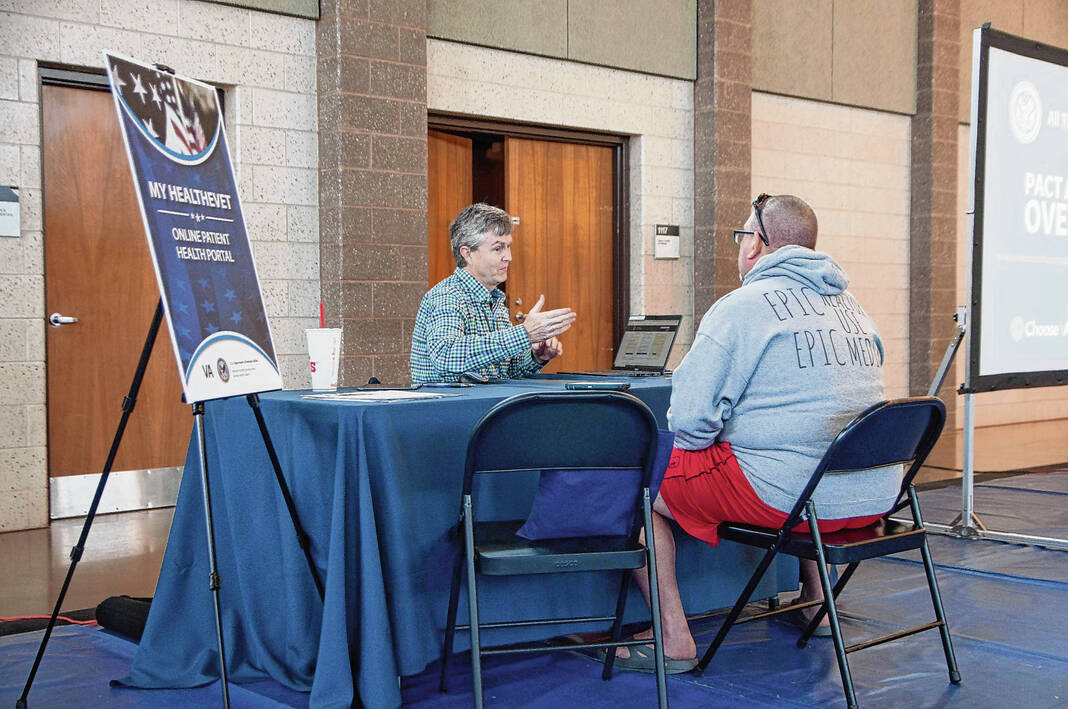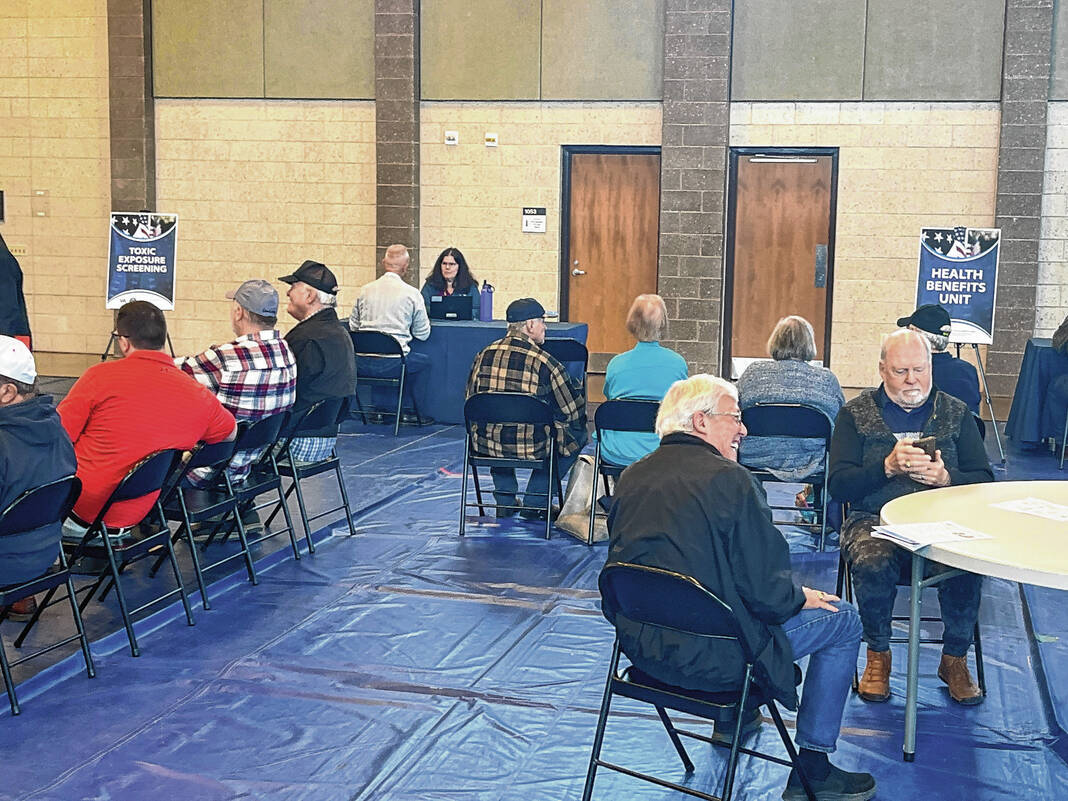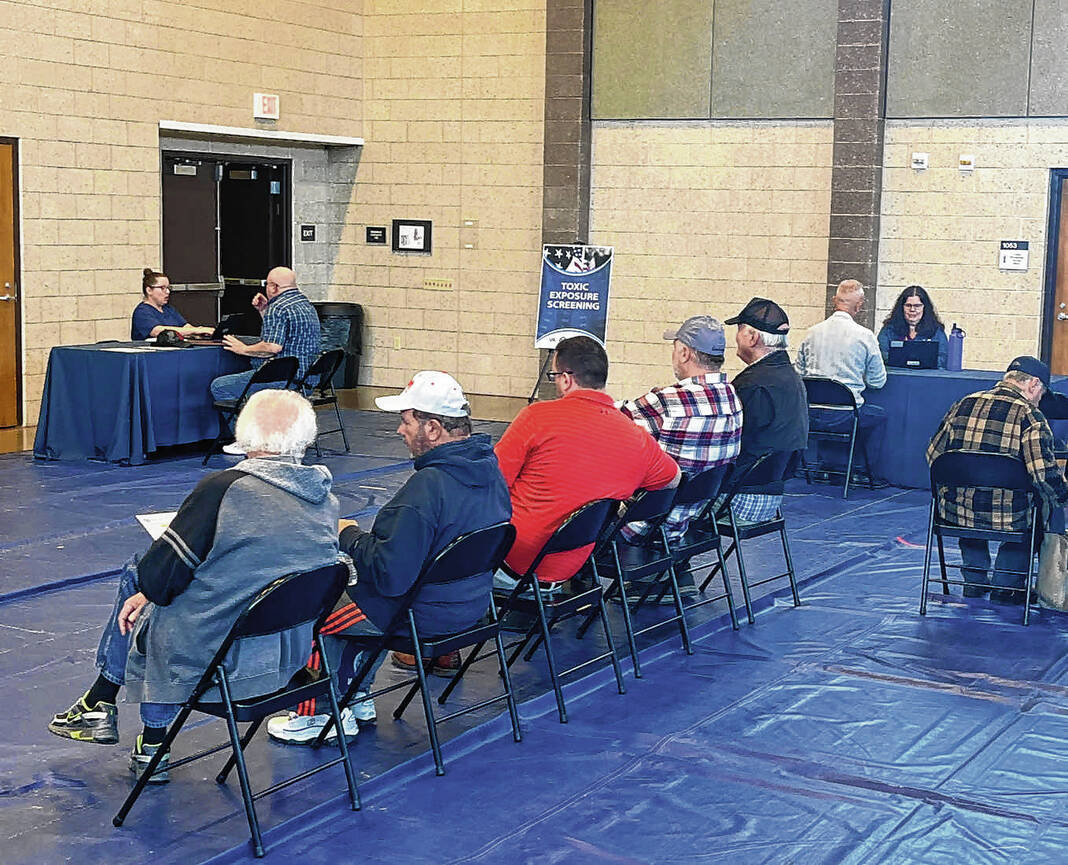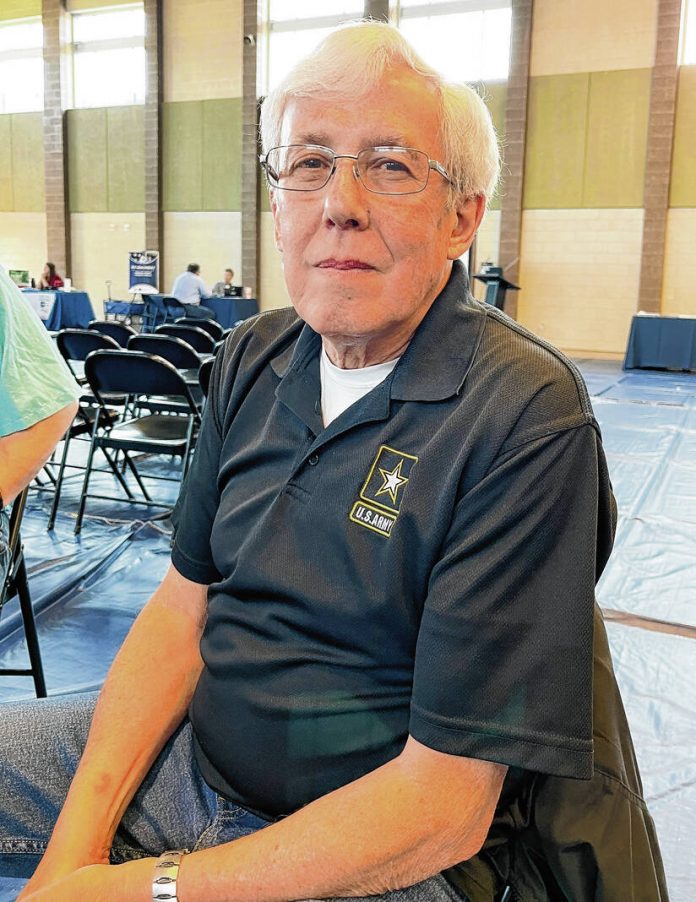
Steve Decot, a Greenwood resident and U.S. Army veteran, at the toxic exposure screening event at the Indiana National Guard Armory in Franklin on April 26. Decot served in the Vietnam War and was exposed to Agent Orange, which has caused a variety of health problems throughout his life.
SUBMITTED PHOTO
The pain shot throughout his body, refusing to relent.
Steve Decot has been dealing with the debilitating condition for decades. The Vietnam War veteran has been diagnosed with peripheral neuropathy — damage to the nerves around the body, which often causes weakness, numbness and pain.
He knew it was a result of exposure to the toxic chemical known as Agent Orange while he served in Vietnam. But he was told he didn’t qualify for benefits.
“I filed for it, and was denied. So I just gave up,” the Greenwood resident said.
For veterans like Decot, new legislation offers hope of treatment for health problems related to their military service. The Promise to Address Comprehensive Toxics Act — known better as the PACT Act — expands the benefits available to veterans who were exposed to toxic chemicals during wartime, which have left them with maladies ranging from high blood pressure to chronic breathing issues to different kinds of cancer.
Decot has started to process of applying for those benefits in April. Years after being denied initially, he sees hope for the future.
“I think there are a lot of veterans who gave up. I’ve talked to a lot of guys who turned in claims years ago and heard nothing. Hopefully, this will help things out,” he said.
The PACT Act was a key piece of bipartisan legislation passed in August 2022 as what is believed to be the largest health care and benefits expansion in Veterans Affairs history. At its core, the law expands VA health care and benefits for service members exposed to burn pits, Agent Orange, and other toxic substances.
The law adds to the list of health conditions that are assumed to be caused by exposure to these substances, including a wide variety of cancers, chronic breathing diseases, high blood pressure and more.
“The PACT Act is a historic new law that will help VA deliver for millions of veterans — and their survivors — by empowering us to presumptively provide care and benefits to vets suffering from more than 20 toxic exposure-related conditions,” Dennis McDonough, VA secretary, said in a statement. “It will also bring generations of veterans into VA health care, which will improve veteran health outcomes across the board.”
A key component is adding to the list of presumptive conditions caused by military service. For veterans to get a disability rating from the VA, their disability must connect to their military service. For many health conditions, veterans need to prove that their service caused their condition.
But certain conditions are automatically assumed to have been caused by service. If a veteran served in a place and time where these presumptive conditions were common, they don’t need to prove the service caused the condition.
“It so greatly expands benefits for our veterans — not only in health care, but for our disabled veterans. It helps build trust for our veterans,” said Donna Raven, PACT Act coordinator for Veteran Health Indiana, the state’s veterans health system. “We’re not giving everyone a blank slate, but we can say, ‘I can see on your papers you were in these places, you have these symptoms, these are things we’ve found to be there. OK, let’s move forward, honor our promise and take care of you.’”
Decot is one of the thousands of veterans in the midst of that process currently. The Wisconsin native was drafted into the U.S. Army in 1970. After basic training and advanced individual training, he was given orders to head to Vietnam. He was an aircraft electrician, and during his first assignments, struggled to adjust to the country.
“It was hotter than hell over there, there were so many mosquitoes. I couldn’t sleep. I hated it as soon as I got there,” he said. “It was bad.”
Decot’s superiors sent him to Pleiku, a city in the central highlands of Vietnam, to serve at Camp Holloway. He was assigned to the 361st Aerial Weapons Company, working on the electrical systems of Cobra gunships that provided support for Special Forces troops in the hazardous region around the Laos, Cambodia and Vietnam border.
Recovery missions were a regular part of his job.
“We worked pretty much 24/7. We were on call of the time; we didn’t have a shift of anything, we just worked where we were needed, and slept when you could sleep,” he said.
Decot served in Vietnam for more than a year, returning to the United States in 1972. He re-enlisted for four years, serving in information technology at Fort Benjamin Harrison. He went on to work on data and IT for years.
Almost immediately upon returning from Vietnam, he noticed health issues developing.
“As soon as I got back, I was down at Fort Campbell, and I started passing out,” he said. “They sent me to the hospital, and I was in there four or five days. They were tapping me for blood draw every two hours.”
Doctors learned he had contracted malaria and parasites during service, but did not realize the extent of his health problems. He was sent to another Army hospital in Colorado with a small group of Vietnam veterans who all had mysterious ailments.
Since that time, Decot has had dozens of issues, ranging from a heart condition to a nodule in his lung to Crohn’s disease to peripheral neuropathy.
“It’d be like if you stuck your finger in a light socket and kept getting shocked. That’s the way my arms, hands, legs and feet feel all the time,” he said. “Trying to sit still, trying to sleep, it’s hard to do.”
About a decade ago, Decot tried to file a disability claim through the VA for his peripheral neuropathy. At the time, he was denied, told that it was too late to be covered by it.
“I was frustrated and said I’ll just forget it,” he said.
When he discovered the PACT Act, he dismissed it initially. But after seeing an article in the newspaper about a Veteran Health Indiana screening for toxins, to help veterans start the process of applying for benefits, he decided to check it out.
At the National Guard Armory in Franklin, he learned all about the expanded benefits available to him.
“The next day, that’s when I went to file a claim,” he said.
To reach veterans such as Decot, Veterans Health Indiana has hosted informational events and screenings for toxins all over the state. People could check to see if they had been exposed to harmful substances during their service — the first step in the process to receiving additional benefits.
The Veterans Benefits Administration was available to talk about disability claims, even those not associated with toxic exposure. Other information will be available regarding benefits veterans may be eligible for, such as home loans and reduced property taxes.
“It’s been beyond rewarding. I come out of those refreshed, recommitted to the mission,” Raven said. “The teams love being out, talking to the spouses or talking to the veterans, and they’re just beaming ear to ear with how happy they are.”
Since the VA started hosting screening events in Indiana, 30,829 veterans have come out to get screened for toxins, and 40% of those reported exposure concerns. More than 9,600 of them had been exposed to Agent Orange or burn pits.
Raven would encourage any veteran who thinks they might qualify to contact the VA, or attend a screening event to learn more.
“Go for it. Try. This is a benefit, and something that the nation has decided was important enough for us to take care of our veterans,” she said.
Decot is now waiting to hear about his status, though he’s optimistic to finally get the help he needs.
“I’ve paid a boatload of money out of my pocket for health and stuff my entire life. It’s getting a little harder to do it,” he said. “I’d like to have a little bit of benefit; I feel like I’ve earned it.”
AT A GLANCE
Promise to Address Comprehensive Toxics Act
What: A key piece legislation passed in August 2022 that expands Veterans Affairs health care and benefits for service members exposed to burn pits, Agent Orange, and other toxic substances.
Who does it help: Expands and extends eligibility for VA health care for veterans with toxic exposures and veterans of the Vietnam, Gulf War, and post-9/11 eras.
How to learn more and apply for benefits: Go to www.va.gov/resources/the-pact-act-and-your-va-benefits


